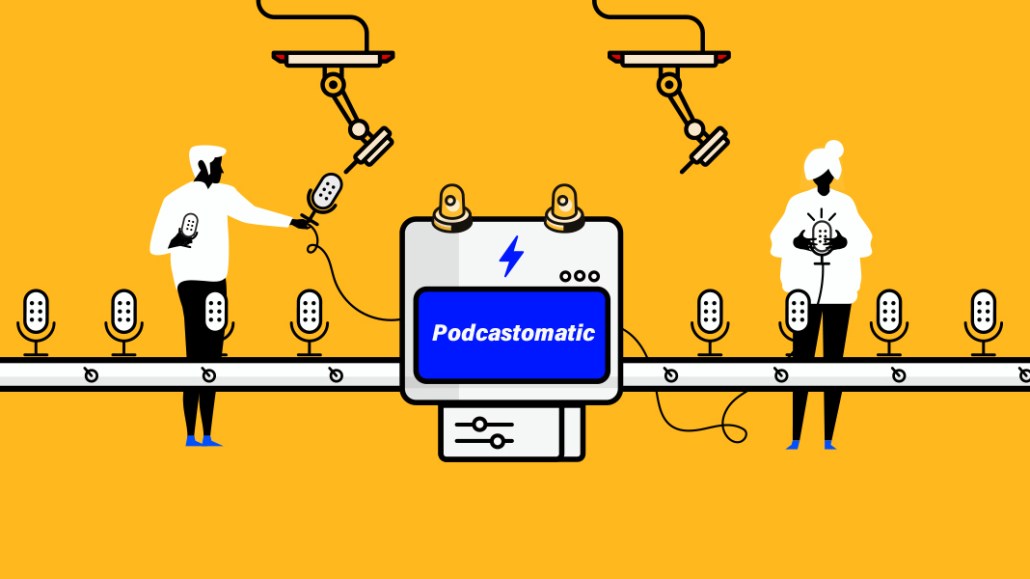Secure your place at the Digiday Media Buying Summit in Nashville, March 2-4
‘Keep the medium premium’: Podcaster creators mull raising their ad loads while preserving high listener engagement

Publishers are trying to wring more revenue out of their podcasts.
Over the past few months, as advertisers across the economy paused or canceled their ad spending, as podcast downloads slid (and then rebounded), a growing number of podcast creators, particularly in entertainment and sports categories, have been trying to figure out how to fit more ads into their shows.
Some of those placements have been added to make up for the drops in downloads many shows experienced in the spring. After a rocky stretch in March and April, when downloads slid by more than 10% as listeners tried to figure out new daily routines, podcasts finished the first half of the year on a high note, with downloads back up above their pre-coronavirus levels, according to data from the podcast analytics service Chartable. Others were added as free inventory offered to keep advertisers happy.
A source close to Megaphone, which offers analytics and podcast ad technology to publishers including Vox Media and the Wall Street Journal, said that in the past month more of its publisher clients had begun asking for advice on how to increase inventory in their shows, particularly mid-roll ads.
But adding inventory to the shows carries risks. Direct response advertising still accounts for nearly half of the podcast ad market, and the effectiveness of those ads declines as ad load increases, said Stephen Smyk, svp of podcast and influencer marketing at the media agency Veritone One. Though the specifics of this dynamic differ show by show, Smyk said that adding a new ad slot to an existing show can degrade the effectiveness of that show’s inventory by up to 20%.
“We believe this is due to both additional messaging that a consumer has to process, along with the location of these additional ad spots within a show,” Smyk wrote in an email. “Consumer response to each ad read and show varies dramatically, but by increasing ad load and extending an episode, or by putting additional ad spots in less preferred places within a show, consumer response can be impacted significantly.”
And adding more content, in the form of longer episodes, does not make up for it, Smyk added. Over the past few years, podcasts have actually gotten shorter, with the median show length now just over 36 minutes, according to analysis by the branded podcast agency Pacific Content.
Adding ads also raises the possibility that listeners will find them annoying and simply skip them. Conal Byrne, the president of iHeartRadio’s podcasting division, said that podcasting, as an industry, has an ad skipping percentage of around 15%, far lower than most other media. By comparison, Magna Global research released in 2017 found that internet users skipped 65% of YouTube ads.
“Podcasting has what I genuinely think is the single best ad product in media right now,” Byrne said. “And some of that is because it’s just a really light ad load.”
Indeed, the top 400 podcasts in the U.S. according to Apple’s rankings contain an average of three ads per episode, according to Statista.
That leaves publishers hoping to raise the revenue they get per episode with a puzzle. Some publishers, such as Vox Media, have been experimenting with new formats, like sponsored show segments, which it runs in existing ad breaks, or sponsored mini-series distributed in its shows’ feeds, rather than increase ad loads at the expense of the listener experience. Ryan Pauley, Vox Media’s chief revenue officer, said he has no plans to increase ad loads in any of its shows.
While the launch of tools including Supporting Cast in the past year have made it easier for podcasts to generate consumer revenue, pivoting to paid often requires generating more content or forgoing ad revenue.
“When you have 220 million downloads a month,” Byrne said, “your goal is really just to keep the medium premium,” Byrne said.
More in Media

Media Briefing: Turning scraped content into paid assets — Amazon and Microsoft build AI marketplaces
Amazon plans an AI content marketplace to join Microsoft’s efforts and pay publishers — but it relies on AI com stop scraping for free.

Overheard at the Digiday AI Marketing Strategies event
Marketers, brands, and tech companies chat in-person at Digiday’s AI Marketing Strategies event about internal friction, how best to use AI tools, and more.

Digiday+ Research: Dow Jones, Business Insider and other publishers on AI-driven search
This report explores how publishers are navigating search as AI reshapes how people access information and how publishers monetize content.








